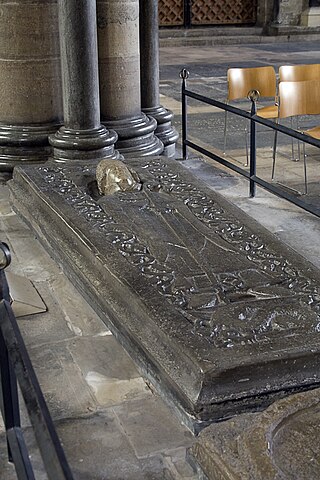Thurstan or Turstin of Bayeux was a medieval Archbishop of York, the son of a priest. He served kings William II and Henry I of England before his election to the see of York in 1114. Once elected, his consecration was delayed for five years while he fought attempts by the Archbishop of Canterbury to assert primacy over York. Eventually, he was consecrated by the pope instead and allowed to return to England. While archbishop, he secured two new suffragan bishops for his province. When Henry I died, Thurstan supported Henry's nephew Stephen of Blois as king. Thurstan also defended the northern part of England from invasion by the Scots, taking a leading part in organising the English forces at the Battle of the Standard (1138). Shortly before his death, Thurstan resigned from his see and took the habit of a Cluniac monk.

Roger of Salisbury, was a Norman medieval bishop of Salisbury and the seventh Lord Chancellor and Lord Keeper of England.

William Giffard, was the Lord Chancellor of England of William II and Henry I, from 1093 to 1101, and Bishop of Winchester (1100–1129).
Geoffrey Rufus, also called Galfrid Rufus was a medieval Bishop of Durham and Lord Chancellor of England.
Roger le Poer was a medieval Lord Chancellor from 1135 until 1139 for King Stephen of England. The son of a powerful bishop, Roger owed his position to his family connections. He lost his office when his father and other relatives lost power. Arrested along with his father, Roger was used to secure the surrender of a castle held by his mother and then disappeared from history.
Robert of Ghent, also called Robert de Gant, was Lord Chancellor of England and Dean of York in the 12th century. The younger son of a nobleman, Robert was probably a member of the cathedral chapter of York before his selection as chancellor by King Stephen of England in the mid-1140s. He is not mentioned often in documents from his time as chancellor, but why this is so is unknown. He became dean at York Minster around 1147. Robert was slightly involved in the disputes over who would be Archbishop of York in the late 1140s and 1150s, but it is likely that his chancellorship prevented his deeper involvement in diocesan affairs. He was no longer chancellor after the death of Stephen, but probably continued to hold the office of dean until his death around 1157 or 1158.
Eustace was the twenty-third Lord Chancellor of England, from 1197 to 1198. He was also Dean of Salisbury and Bishop of Ely.
Robert Bloet was Bishop of Lincoln 1093–1123 and Chancellor of England. Born into a noble Norman family, he became a royal clerk under King William I. Under William I's son and successor King William II, Bloet was first named chancellor then appointed to the See of Lincoln. Continuing to serve the king while bishop, Bloet remained a close royal councillor to William II's successor, King Henry I. He did much to embellish Lincoln Cathedral, and gave generously to his cathedral and other religious houses. He educated a number of noblemen, including illegitimate children of Henry I. He also was the patron of the medieval chronicler Henry of Huntingdon, and was an early patron of Gilbert of Sempringham, the founder of the Gilbertine monastic order.
Thomas II was a medieval archbishop of York.

Reginald Fitz Jocelin was a medieval Bishop of Bath and an Archbishop of Canterbury-elect in England. A member of an Anglo-Norman noble family, he was the son of a bishop, and was educated in Italy. He was a household clerk for Thomas Becket, but by 1167 he was serving King Henry II of England. He was also a favourite of King Louis VII of France, who had him appointed abbot of the Abbey of Corbeil. After Reginald angered Becket while attempting to help negotiate a settlement between Becket and the king, Becket called him "that offspring of fornication, that enemy to the peace of the Church, that traitor." When he was elected as a bishop, the election was challenged by King Henry's eldest son, Henry the Young King, and Reginald was forced to go to Rome to be confirmed by Pope Alexander III. He attended the Third Lateran Council in 1179, and spent much of his time administering his diocese. He was elected Archbishop of Canterbury in 1191, but died before he could be installed.

Josceline de Bohon or Bohun was an Anglo-Norman religious leader.
Herbert Poore or Poor (died 1217) was a medieval English clergyman who held the post of Bishop of Salisbury during the reigns of Richard I and John.

Nigel was an Anglo-Norman clergyman and administrator who served as Bishop of Ely from 1133 to 1169. He came from an ecclesiastical family; his uncle Roger of Salisbury was a bishop and government minister for King Henry I, and other relatives also held offices in the English Church and government. Nigel owed his advancement to his uncle, as did Nigel's probable brother Alexander, who like Nigel was advanced to episcopal status. Nigel was educated on the continent before becoming a royal administrator. He served as Treasurer of England under King Henry, before being appointed to the see, or bishopric, of Ely in 1133. His tenure was marked by conflicts with the monks of his cathedral chapter, who believed that Nigel kept income for himself that should properly have gone to them.
Robert Braybrooke was a medieval Dean of Salisbury and Bishop of London.
William Ayermin was a medieval Bishop of Norwich.
Waleran was a medieval Bishop of Rochester.

Roger Martival was a medieval Bishop of Salisbury in England.

Samson was a medieval English clergyman who was Bishop of Worcester from 1096 to 1112.
John Salisbury, O.S.B. was a Welsh clergyman who held high office in the pre- and post-Reformation church in England.







